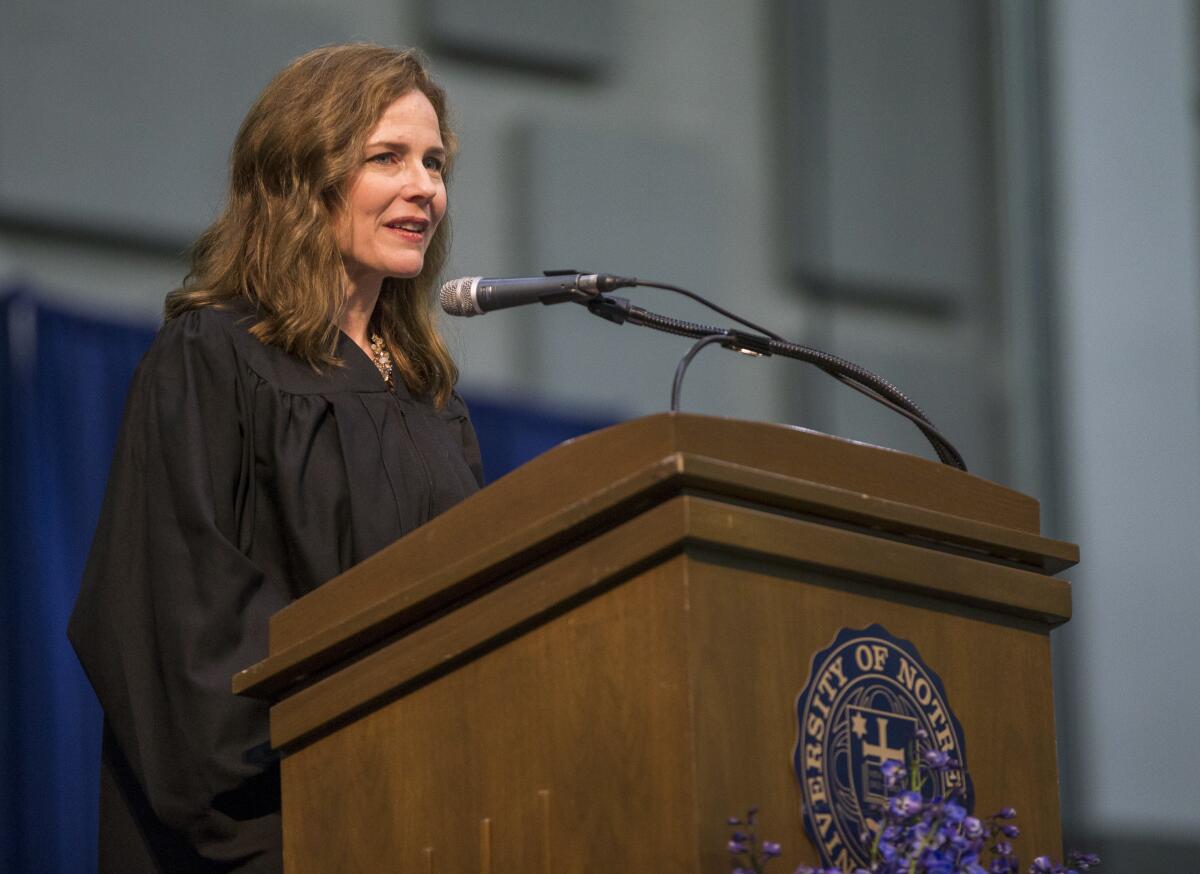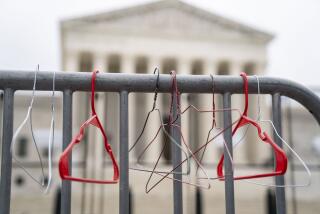Trump ready to nominate Amy Coney Barrett to replace Ginsburg on Supreme Court

- Share via
WASHINGTON — President Trump plans to nominate Amy Coney Barrett, a conservative federal appeals court judge, to fill Ruth Bader Ginsburg’s position on the Supreme Court on Saturday, barring a last-minute change of heart, pushing fresh fights over abortion rights and the Affordable Care Act to the center of an already heated presidential campaign.
A Trump campaign official who had been pushing a rival candidate, Judge Barbara Lagoa of Florida, said Friday that Trump was “99.9%” certain to choose Barrett, who has been on Trump’s short list since he nominated Brett M. Kavanaugh to the court in 2018 to replace Justice Anthony M. Kennedy.
“The president had sort of made a commitment emotionally and in his mind to Amy Barrett,” the official said.
Later in the day, Sen. John Cornyn of Texas, a member of the Judiciary Committee, which will handle the nomination, posted a statement to Twitter treating the nomination as a done deal.
“The Senate will begin a thorough review of Judge Barrett’s nomination, a process that shouldn’t be rushed,” Cornyn wrote. “Despite previous attacks based on her religious faith, I hope Democrats choose not to engage in another character assassination, as they did against Justice Kavanaugh.”
When Barrett was nominated to the appeals court, Sen. Dianne Feinstein (D-Calif.) and some other Democrats questioned some of her writings, which they believed suggested she saw a justification for putting Catholic teachings ahead of secular law in some cases.
Trump had been intrigued by Lagoa, a Latina from Florida. Some advisors believed that choosing a Cuban American for the high court might help Trump carry Florida, a must-win state for him in the election.
Ultimately, however, he decided he was more certain that Barrett “is a conservative now and a conservative 20 years from now,” the official said.
Trump told reporters Friday night after returning from a trip to Florida that he did not meet with Lagoa while he was there.
He said that he had made up his mind but would not confirm that Barrett was the choice.
“I haven’t said it was her but she is outstanding,“ he said.
If confirmed to replace Ginsburg, the court’s most liberal member who died last week, Barrett, 48, would likely give conservatives a solid 6-3 majority on the court that could leave its imprint for a generation.
Based on her writings as a law professor, antiabortion activists are convinced she would provide the crucial vote on the court to overturn or severely restrict Roe vs. Wade, the 1973 decision that legalized abortion nationwide. She also has expressed a broad view of the 2nd Amendment’s right to bear arms, potentially providing a vote to strike down some state or local gun restrictions.
Senate Majority Leader Mitch McConnell (R-Ky.) has pledged that the Senate will vote on Trump’s nominee. He has not said publicly that the vote will take place before the election, but Senate leaders have begun making preparations for a fast-track process aimed at making that possible.
Democrats have insisted that the winner of November’s election should be allowed to fill the vacancy on the court — a position that a majority of the public appears to agree with, according to recent polls. A move to confirm Barrett before the election could endanger some incumbent Republicans seeking reelection this year.
Democrats are particularly incensed that McConnell is moving ahead with the current nomination after he refused to hold hearings or a vote ahead of the 2016 presidential election for Merrick Garland, President Obama’s pick to replace Justice Antonin Scalia. At the time, he argued that voters should have a say in the future of the court.
But Republican leaders, who fear they could lose their Senate majority and the White House in the election, appear to have decided that strengthening a conservative majority on the court that could last for decades is worth the potential political price.
Barrett, given her youth and sterling conservative credentials, appears to many Republicans as a near-perfect candidate.
Early in her judicial career, Barrett clerked for Scalia, considered the leading conservative on the court for three decades before he died in 2016.
Like Scalia, she is considered an originalist, a philosophy whose adherents believe they are upholding the founders’ original intent when interpreting the Constitution and cast a skeptical eye on later, more expansive interpretations of rights.
A professor at Notre Dame Law School, she was nominated by Trump in 2017 to serve on the U.S. 7th Circuit Court of Appeals, which hears cases from Illinois, Indiana and Wisconsin.
Trump’s choice of her could strengthen his backing from conservatives, especially those who view the court as a central issue and have stuck with Trump despite reservations about his character and behavior.
Before the 2016 election, Trump released a list of potential court nominees that had been vetted by conservative groups, helping the political outsider lock down support from conservatives. Barrett was not on the original list but was added in 2017.
In addition to overturning Roe, many religious conservatives would also like to pull back on the expansion of rights for gay couples and allow a greater role for religion in public life.
Business conservatives are hoping the court will push back on environmental regulations, protections for labor unions, and other legal interpretations that have favored consumers.
But a potential swing to the right could also galvanize political opposition from liberals, who worry not only that the court would overturn the abortion precedent, but could also help Trump follow through on his threats to use the courts to litigate the November election if he loses.
The court has also issued two decisions upholding Obamacare that could be in jeopardy. The justices will hear a third challenge to the law the week after the election.
More to Read
Get the L.A. Times Politics newsletter
Deeply reported insights into legislation, politics and policy from Sacramento, Washington and beyond. In your inbox three times per week.
You may occasionally receive promotional content from the Los Angeles Times.











